新概念第二册lesson17笔记整理版
- 格式:docx
- 大小:17.50 KB
- 文档页数:3

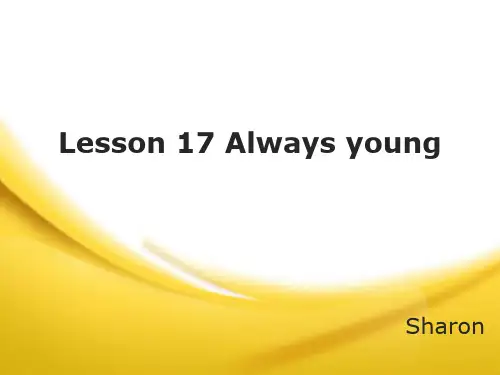
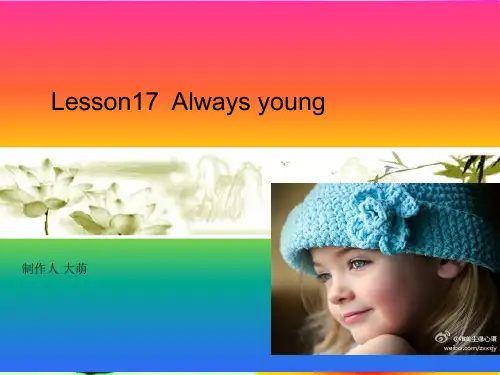
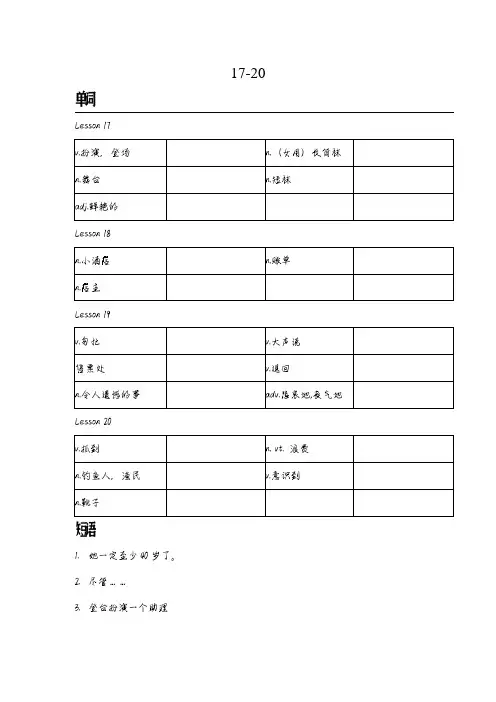
17-20 单词
Lesson 17
Lesson 18
Lesson 19
Lesson 20
短语
1.她一定至少40岁了。
2.尽管……
3.登台扮演一个助理
4.一条鲜红色的裙子
5.一件橘红色的衬衫
6.成熟的、成人的
7.我正在寻找我的包,但是我没有找到它。
8.支付账单
9.把这本书还给我
10.上交你的作业
11.戒烟
12.把这个玩具赠送给那个贫穷的女孩
13.把这台电脑带去图书馆
14.我将要去办公室取一本书。
15.他以30000元卖了他的汽车。
16.随时
17.这个戏可能已经开始了
18.就在那时
19.退这两张票
20.我还是买一辆车好。
21.他有一个两点的会。
22.畅销/滞销
23.匆忙到售票处
24.我给了他一磅茶叶作为对他的帮助的回报。
25.。
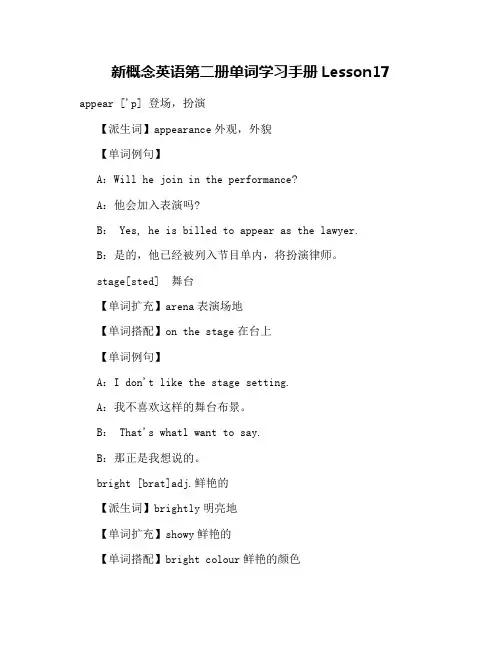
新概念英语第二册单词学习手册Lesson17 appear ['p] 登场,扮演【派生词】appearance外观,外貌【单词例句】A:Will he join in the performance?A:他会加入表演吗?B: Yes, he is billed to appear as the lawyer.B:是的,他已经被列入节目单内,将扮演律师。
stage[sted] •舞台【单词扩充】arena表演场地【单词搭配】on the stage在台上【单词例句】A:I don't like the stage setting.A:我不喜欢这样的舞台布景。
B: That's whatl want to say.B:那正是我想说的。
bright [brat]adj.鲜艳的【派生词】brightly明亮地【单词扩充】showy鲜艳的【单词搭配】bright colour鲜艳的颜色【单词例句】A: Why do the pearls look so dull?A:达些珍珠为什么看起来这么暗淡?B: lf you don't care for this,I can show you something brighter.B:如果您不喜欢这个,我能够给您看些比较有光泽的。
stocking ['stk] (女用)长筒袜【单词例句】A: You have a runm your stocking.A:你的丝袜抽线了。
B: Oh,I need to change it at once.B:哦,我得马上换了它。
sock [sk] 以,短袜。
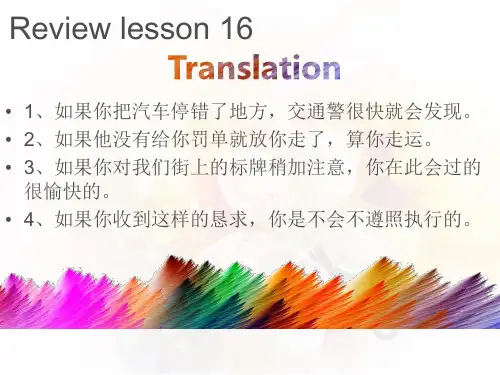
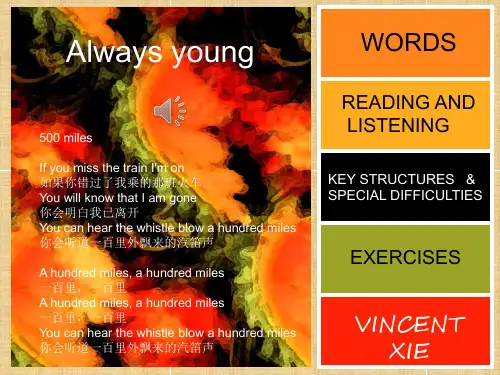
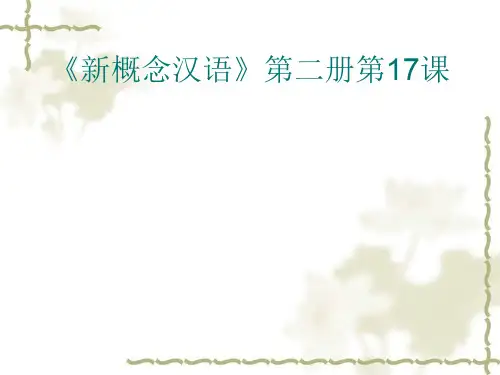
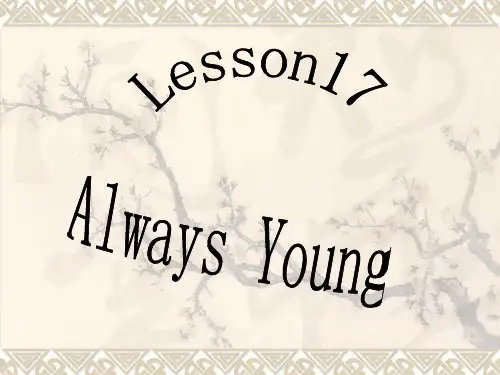
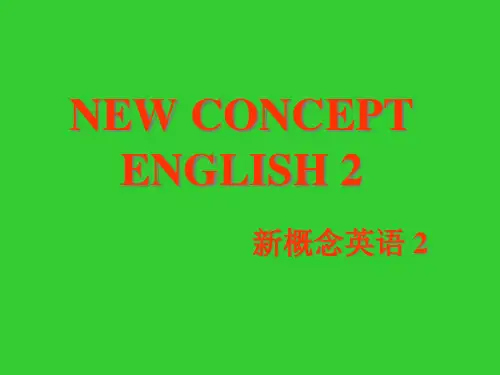
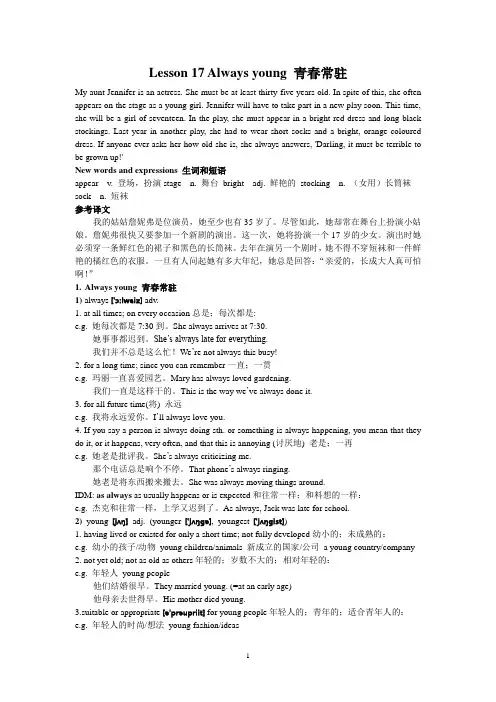
Lesson 17 Always young 青春常驻My aunt Jennifer is an actress. She must be at least thirty-five years old. In spite of this, she often appears on the stage as a young girl. Jennifer will have to take part in a new play soon. This time, she will be a girl of seventeen. In the play, she must appear in a bright red dress and long black stockings. Last year in another play, she had to wear short socks and a bright, orange-coloured dress. If anyone ever asks her how old she is, she always answers, 'Darling, it must be terrible to be grown up!'New words and expressions 生词和短语appear v. 登场,扮演stage n. 舞台bright adj. 鲜艳的stocking n. (女用)长筒袜sock n. 短袜参考译文我的姑姑詹妮弗是位演员,她至少也有35岁了。
尽管如此,她却常在舞台上扮演小姑娘。
詹妮弗很快又要参加一个新剧的演出。
这一次,她将扮演一个17岁的少女。
演出时她必须穿一条鲜红色的裙子和黑色的长筒袜。
去年在演另一个剧时,她不得不穿短袜和一件鲜艳的橘红色的衣服。
一旦有人问起她有多大年纪,她总是回答:“亲爱的,长成大人真可怕啊!”1.Always young 青春常驻1) always [ˈɔ:lweiz] adv.1. at all times; on every occasion总是;每次都是:e.g. 她每次都是7:30到。
新概念英语二-----------------LESSON 17重点词组:at least 至少in spite of 尽管on the stage 在舞台上have to 不得不take part in 参加a girl of seventeen 17岁女孩in the play 在演出中grown up 成熟的语法点:1. appeara. 出现,显露 Suddenly,a car appeared. 突然,一辆小汽车出现了。
b. 当众露面;登场I can't appear in this dress at the party. 我不能在晚会上穿这衣服露面。
c. 似乎,看起来好象(系动词) She appears to know you. 她似乎认识你。
2. growa. 生长,成长,发育 Trees of this kind don't grow in our country. 我们国家不长这种树。
b. grow up 长成,成熟(其被动态表示长大成人)Lucy has grown up a lot since I last saw her. 自从我上次见到她之后,露西已成熟了许多。
3. as的几种用法a. 作为介词,表示“作为” 、"以身份” 等In this film,he appeared as a policeman. 在这部影片中,他扮演一名警察。
As a mechanic,he can't always keep himself clean. 作为机修工,他无法总保持身上干净b. 作为连词,可以表示“因为” 、“正当… 时候” 、“以方式” 或“如同...那样” 等含义She cooked the dinner as her mother taught her. 她按母亲教她的方式做了晚餐。
4. She must be at least thirty-five years old.她至少也有35岁了。
【
Lesson 17 Always young
1、课文语言点:
1)以-ess结尾的是女性
actor:男演员 actress:女演员
waiter:男服务员 waitress:女服务员
prince:王子 princess:公主
host:男主人 hostess:女主人
god:神 goddess:女神
…
2)at least 至少 at most:至多
3)thirty-five years old:表示年龄的表达方式:
基数词+years+old:一般做表语 He is thirty-five years old.
基数词+-year+-old:一般做定语 He is thirty-five-year-old.
4)in spite of this:尽管如此 In spite of this,I still like school.尽管如此,
我仍然喜欢上学。
in spite of =despite=regardless of 不管,尽管
5)join:参加了某一团体 join sb: 加入我们这个团体来吧。Come here and join us.
join the army:参军
&
join the Party:入党
attend:出席 attend the meeting:参加会议,出席会议
attend the party:出席宴会
attend the class:上课
Thank you for your attending. 谢谢大家的出席。
take part in:参加某一种活动
~ the race 参加比赛
~ a paly 参加一个剧的演出
<
~ the party 参加聚会
6)a girl of seventeen:of seventeen 介词短语做后置修饰成分修饰a girl
类似的用法:a coat of bright color:一件颜色鲜艳的外套
a vase of value 一只具价值的花瓶
7)in+颜色:穿着…颜色的衣服 He is in black. 他穿着黑衣服。
in:穿着 She is in jeans. 她穿着牛仔裤。
表示“穿”的单词还有wear:wear a beard 留着络腮胡子
wear a coat:穿着外套
~
wear long hair:留着长发
wear a watch 戴着手表
wear a necklace 戴着项链
8)grow:vi. 生长,发育 可以指人、动物或植物
grow up:长大,成熟 可以指人或动物,不能指人 (文中有例句)
be grown up:长大的一种状态 He is grown up. 他长大了。
grown-up: n.成年人
9) orange-colored:adj+n-ed 类似的词有: noble-minded:思想崇高的
%
good-tempered:好脾气的
adj+现在分词:good-looking
10)文中的ever=at any time 在任何时候 adv
ever只有一个词性,即副词。另有“永远、曾经、究竟”的意思。
2、词汇
1)appear(只作不及物动词):vi出现,显现,呈现 A ship appeared on the horizon.
(公开、正式)露面,登场,扮演 appear on the stage 出场演出
He appeared on the stage when he was only three.
.
似乎,看起来像:She appears to know you.她似乎认识你。
2)stage n.舞台 on the stage:在舞台上 quit the stage(of history) 退出舞台
3)bright:鲜艳的;闪亮的,发光的;生气勃勃的;聪明的;乐观的,前途光明的
Eg:bright red:鲜红色 bright sunshine:灿烂的阳光 bright child:聪明的孩
子
a bright future 光明的前途 bright eyes:明亮的眼睛
4)stocking:(女用)长筒袜
sock:(男女通用)短袜
3、 语法:must,have to,have got to
}
must have to have got to
must not(mustn’t) don’t have to haven’t got to
Must sb… Do/Does sb have to… Have/Has sb to…
1) must表示“必须”
a. 可用于肯、否、疑问句时,否定形式mustn’t表示“禁止”,“不允许”,“一定不要”
b. —
c. must一般只用于现在时和将来时,要在过去表示“必须”的意思用had to
d. must开头的一般疑问句,若否定回答,用needn’t,不用mustn’t.
eg: Must I clean all the room No,you needn’t.
补充:must 和have to、have got to 区别
a. must:表达主观的看法,认为有义务或责任去做某事,have to和have got to 侧重于
客观需要,有“不得不”、“被迫”之意。
例如:Everyone must keep the law. 人人都要守法。
The last train has gone. We’ll have to walk home. 最后一班车已经开了,我们
得走回家了。
b. have to和have got to区别:
)
have got to 比have to 更加口语化
当句子中有频度副词often,always,usually等时,一般用have to ,而非have got to.
Eg:I often have to get up at 5. 我经常5点就得起床。
2) must 可以表示推测
must表示推测时,意为“准是”、“一定是”,表示较有把握的推测通常只用于肯定句。
若用于否定句或疑问句,则用can代之。Eg:Mary’s light is on. She must be at home.
She can’t be out. Mary的房间开着灯,她一定在家,不可能出去。
拓展
:
a. must对现在的状态或现在正发生的事情的推测时, must 后面通常接系动词be 的原
形或行为动词的进行式。 You have worked hard all must be tired.你辛苦干一整天,
一定累了。(对现在情况的推测判断)
He must be working in his office. 他一定在办公室工作呢。
…
表示对已发生的事情的推测时,must 要接完成式。
I didn”t hear the phone. I must have been asleep. 我刚才没有听到电话,我想
必是睡着了。
c. must表示对过去某时正发生的事情的推测,must 后面要接不定式的完成进行式。
---Why didn”t you answer my phone call
---Well, I must have been sleeping, so I didn”t hear it.
句型时态 肯 定 推 测 否 定 推 测
—
疑 问 推 测
对现在的推测 Must/can/may+be Can’t+be Can sb be---
对过去的推测
Must/can/may / might could+have done can’t/couldn’t/may not/ # might not+have done Can/could sb+have
done
对将来的推测 Must/can/may/could Might+do Can’t/may not+do Can/may/+do
对现在正发生或将
来发生事情的推测
Must/may/can+be doing Can’t be doing Can sb be doing
对过去正在发生事情的推测 Must+have been doing Can’t+have been doing Can sb have been
doing